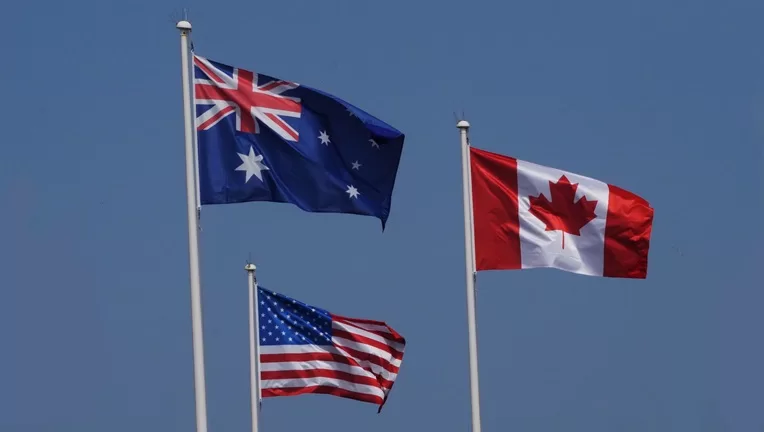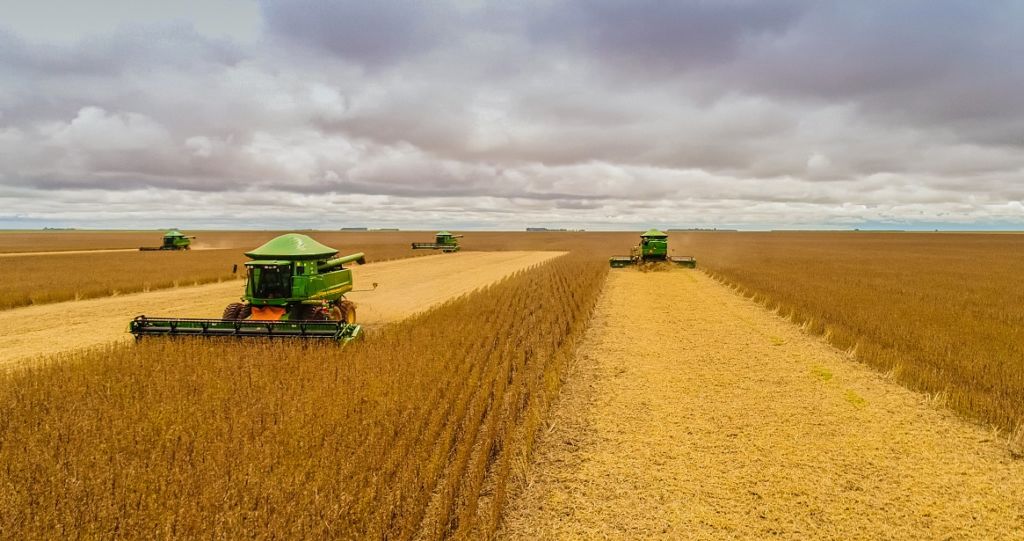
Visa requirements resumed for some nationalit...
read more

Brazilian soya bean production and exports reached their highest levels ever in the 2020/21 season, despite the challenges posed by the ongoing pandemic
Sowing delay
Even with a late start and facing the various challenges and disruptions arising from the COVID-19 outbreak in the global supply chain, the soya bean sector had its best results ever since the oilseed became the leading commodity in Brazil’s export basket.
Although sowing for the 2020/21 crop was initially delayed due to lack of rainfall, the soya bean eventually benefited from the good weather that followed, leading to yet another bumper crop.
Bumper crop
The National Association of Grain Exports (ANEC) reports that the country yielded an all-time high of 137.1 million metric tons (mmt) of soya beans in the 2020/21 harvest.
In contrast to maise (corn), which suffered substantial production and export losses, soya bean shipments rose from 82.3 mmt in 2020 to an impressive 86.6 mmt in 2021, according to ANEC, beating the 2018 record. Most of these shipments departed Brazilian ports between March and early June.
The leading soya bean exporting ports were Santos (27%), Paranaguá (15%) and Rio Grande (15%), followed by Itaqui (12%) and Barcarena (10%) in the Northern Arc.
About 70% of the 2021 soya bean shipments were bound for China, most of them leaving from Brazil’s southern ports via the Cape of Good Hope.

Soya bean meal exports also hit record production and export in 2021, ending the year with 16.9 mmt shipped abroad, mainly departing from Santos (41%), Paranaguá (29%), Rio Grande (16%) and Aratu (7%). According to ANEC, the largest buyers of the Brazilian soya bean meal were Thailand (15%), Indonesia (13%), the Netherlands (11%), South Korea (9%) and France (9%).
Market outlook
The increased demand for bulk commodities and a tight supply of bulk carriers, amid the unavailability of containers, led to certain foodstuffs such as refined sugar and coffee beans being carried as breakbulk. Nevertheless, the Brazilian soya bean remains heated, with average export prices rising year after year, so the prospects are for exports to remain at very high levels.
The leguminous oilseed remains Brazil’s main export commodity in terms of revenue, second only to iron ore in gross weight shipped. Soya bean FOB sales went from US$ 28.6 billion in 2020 to US$ 38.6 billion last year, according to data from the Foreign Trade Secretariat (SECEX).

Another key factor benefiting soya beans producers is the continued appreciation of the US Dollar vis-à-vis the Brazilian Real. While the oilseed is priced in dollars, it is ultimately paid in the still-low valued local currency.
Official estimates
The latest assessment by the National Supply Company (CONAB) estimates that the 2020/21 soya bean output will close at 137.3 mmt. Soya bean output for 2021/22 is forecast at 142.8 mmt, a 4% growth compared to the previous season. The planted area should also expand 3.7% to 40.4 million hectares.
CONAB estimates exports of the oilseed to reach a record 90.7 mmt in the 2021/22 marketing year.
The federal agency recognises that weather-related events that compromised the performance of some crops the past season are determining factors for the otherwise optimistic outlook for 2021/22.
Soya bean prices keep an upward trend, thanks to the replenishing of stocks in importing countries amid heated demand for Brazilian agriproducts, especially those used for animal feed.
Infrastructure developments
In response to the growing requirements of consumer markets, particularly China, regarding control of agrochemical residues and pests, and tight protein quality controls, Brazilian producers have quickly adapted to meet the buyers’ needs and cope with the increasing demand for quantity and quality.
Bulk terminals in Santos, Paranaguá and Itaqui are increasing their cargo handling and storage capacity, with new silos being built, some of them starting operations as early as 2022. At the same time, grain elevators at Vila do Conde/Barcarena are expanding their capacity and gradually performing mid-river barge-vessel operations – for discharging imported fertilisers and loading soya beans (and corn) for export.
Moisture content
In addition to foreign materials and free fatty acids (FFA), the critical quality factors that determine the soundness of the soya bean for safe handling, storage, and sea carriage are the cargo moisture content (MC) and temperature at loading.
ANEC’s widely-adopted soya bean contracts specify a maximum MC of 14%, in line with the Brazilian Ministry of Agriculture, Supply and Livestock (MAPA) recommendations. On the other hand, reputable P&I clubs and international commodity scientists consider this MC limit as far too high.
Soya beans with excessive moisture content combined with high temperature are biologically unstable and prone to self-heating during sea passage, especially on the long hauls between Brazil and Asian ports, which can take up to 45 days, plus the waiting time at the anchorage. The longer the berth-to-berth transit time – and the higher the MC and temperature –, the greater the chance of cargo deterioration.
Last year, the opening of Brazil’s soya bean exports window was pushed forward due to adverse weather that delayed harvesting and processing. Bulk carriers that arrived at Brazilian ports in January and early February 2021 faced congestions due to the unavailability of cargo at the loading facilities.
There were genuine concerns over quality issues as soya beans with high MC were reported, causing rows of trucks to form due to drying processes taking longer than usual. There were delays in deliveries to grain elevators and consequent congestion at the anchorage areas of traditional bulk ports.
Nevertheless, so far, there have been no substantial reports of significant quality issues associated with the soya bean shipped last year. However, some of the 2021 shipments are still underway, and many of the vessels arriving at Asian ports in the coming weeks will still have to queue at anchorage for their turn to berth, thus further extending the transit time.
Loss prevention recommendations
Our publication Loading Soya Beans in Brazil – Practical Guidance provides comprehensive information on loss prevention measures to be taken by shipowners, shipmasters and crews to safely load and transport the precious beans across the seas.
Please read our disclaimer.
Related topics:
Rua Barão de Cotegipe, 443 - Sala 610 - 96200-290 - Rio Grande/RS - Brazil
Telephone +55 53 3233 1500
proinde.riogrande@proinde.com.br
Rua Itororó, 3 - 3rd floor
11010-071 - Santos, SP - Brazil
Telephone +55 13 4009 9550
proinde@proinde.com.br
Av. Rio Branco, 45 - sala 2402
20090-003 - Rio de Janeiro, RJ - Brazil
Telephone +55 21 2253 6145
proinde.rio@proinde.com.br
Rua Professor Elpidio Pimentel, 320 sala 401 - 29065-060 – Vitoria, ES – Brazil
Telephone: +55 27 3337 1178
proinde.vitoria@proinde.com.br
Rua Miguel Calmon, 19 - sala 702 - 40015-010 – Salvador, BA – Brazil
Telephone: +55 71 3242 3384
proinde.salvador@proinde.com.br
Av. Visconde de Jequitinhonha, 209 - sala 402 - 51021-190 - Recife, PE - Brazil
Telephone +55 81 3328 6414
proinde.recife@proinde.com.br
Rua Osvaldo Cruz, 01, Sala 1408
60125-150 – Fortaleza-CE – Brazil
Telephone +55 85 3099 4068
proinde.fortaleza@proinde.com.br
Tv. Joaquim Furtado, Quadra 314, Lote 01, Sala 206 - 68447-000 – Barcarena, PA – Brazil
Telephone +55 91 99393 4252
proinde.belem@proinde.com.br
Av. Dr. Theomario Pinto da Costa, 811 - sala 204 - 69050-055 - Manaus, AM - Brazil
Telephone +55 92 3307-0653
proinde.manaus@proinde.com.br
Rua dos Azulões, Sala 111 - Edifício Office Tower - 65075-060 - São Luis, MA - Brazil
Telephone +55 98 99101-2939
proinde.belem@proinde.com.br